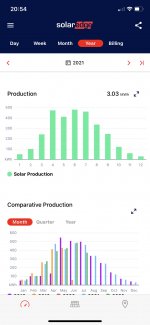It looks to me like EV only makes it feasible if you are a taxi driver and you use all your battery at night and charge it during the day. If you are out during the day and home at night like most people then you can't use the excess to charge your car. Most people will generate the majority of the energy when they don't need it. This will be solved by batteries but again I think we are several years away from them being a reasonable price.
We are at a spike in energy prices as well. I expect that they will go down in the long term, not up. The war in the Ukraine is causing a lot of the issues (and the government refusing to help). Once the war ends and a different government comes in then there might be something done about reducing prices for energy and increasing subsidies for green initiatives. The current government are more interested in the share prices than the bill payers.
I've done some quick calculations based on the MSE linked above:
£6,500 upfront cost, £276 savings per year, £95 feed in takes 19 years to get back to £0. £6,500 invested at 7% per year -(£276+£95) after 19 years will have you at £9,356. 5% would be £5,206. 5.077% is the point where you'd earn exactly the amount to cover your savings each year. Anything under that then solar panels would overtake it at some point (assuming no extra cost). That obviously changes if your savings is higher. 7% is the value that is usually used though as long term return. At 7% then savings increasing to £360 is where 7% return doesn't lose you money.It would be 30 years before your panels get you to +£6,500.
Below is the MSE table with the opportunity cost of investing in the stock market with a low cost index tracker. Return is at the point of break even for the solar panels:
| Upfront | Savings | Feed-In | Years to £0 | Stocks @ 3% | Stocks @ 5% | Stocks @ 7% |
| £ 6,500 | £ 166 | £ 95 | 26 | £ 4,094 | £ 9,555 | £ 18,770 |
| £ 6,500 | £ 207 | £ 95 | 23 | £ 3,233 | £ 7,386 | £ 13,998 |
| £ 6,500 | £ 276 | £ 95 | 19 | £ 2,379 | £ 5,206 | £ 9,356 |
| £ 6,500 | £ 345 | £ 95 | 16 | £ 1,943 | £ 4,018 | £ 6,877 |
| £ 6,500 | £ 414 | £ 95 | 14 | £ 1,596 | £ 3,241 | £ 5,412 |
I've also read that solar panels should be serviced. Annual servicing is about £100 so that's another addition to payback years if you opt for that cost. No idea if that is a condition of warranty like it is with boilers.



